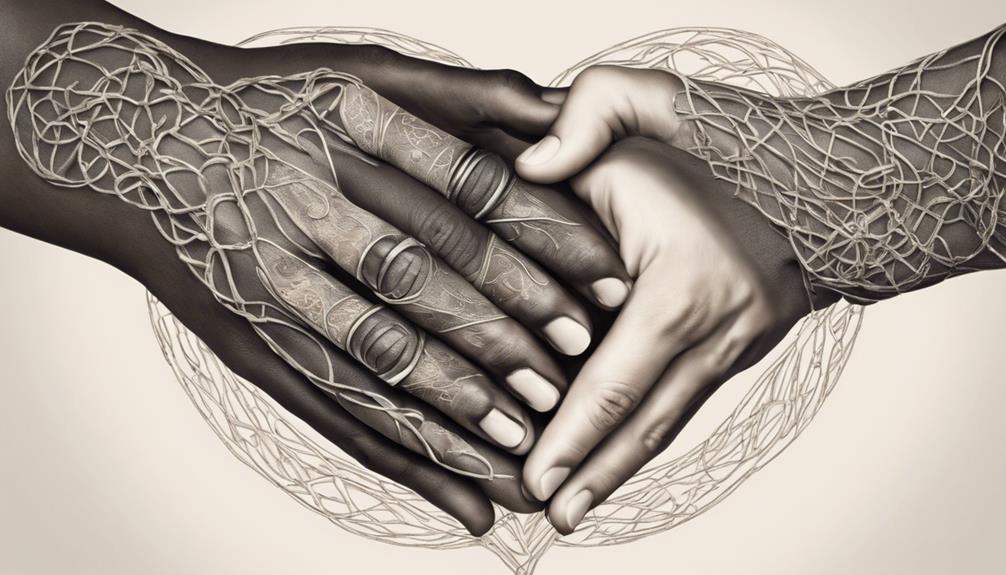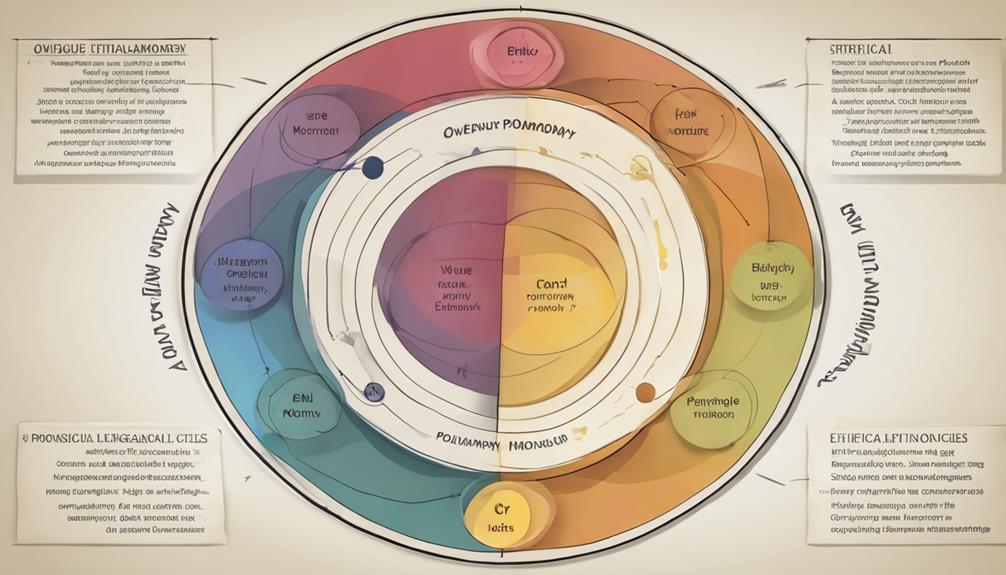In relationships, it is often said that “the more, the merrier”. Ethical non-monogamous relationships provide a different outlook on intimacy and connection compared to traditional norms.
The intricacies of navigating multiple relationships while upholding ethical standards and mutual respect bring forth a complexity that intrigues many. As we explore the dynamics and nuances of these relationships, we uncover a world where communication, boundaries, and diverse forms of love intersect in ways that challenge conventional notions of partnership.
Key Takeaways
- Embracing diverse relationship structures and dynamics fosters acceptance and understanding.
- Prioritizing open communication and nurturing emotional connections strengthens bonds.
- Establishing clear ethical boundaries ensures respect, trust, and emotional safety.
- Cultivating a supportive environment upholds honesty, respect, and love in multiple relationships.
Key Characteristics of Ethical Non-Monogamy
In ethical non-monogamous relationships, we prioritize clear communication and mutual agreement as key characteristics for fostering healthy and respectful connections with multiple partners. People practicing ENM understand that open and honest communication is the foundation of any successful relationship, especially when navigating multiple romantic and sexual connections. By openly discussing boundaries, desires, and expectations, partners in ethical non-monogamous relationships create a space where emotional connections can flourish without misunderstandings or hidden agendas.
In these relationships, it's essential for all parties involved to feel heard and valued. Each partner's feelings and emotional well-being are considered equally important, leading to a deeper sense of understanding and empathy within the relationship dynamic. By actively practicing ethical behavior and mutual respect, individuals in ENM relationships can cultivate a supportive and loving environment where everyone's needs are acknowledged and honored. Prioritizing communication and emotional connections paves the way for fulfilling and authentic relationships in the realm of ethical non-monogamy.
Communication in ENM Dynamics

Navigating the intricate web of relationships in ethical non-monogamy requires continuous and transparent communication about desires, boundaries, and expectations among all involved parties. In ENM dynamics, open and honest discussions are essential to ensure everyone's needs are met and respected. Regular communication fosters trust and allows for the exploration of emotions and concerns with transparency. It is through clear and respectful communication that partners can navigate the complexities of multiple relationships effectively. By prioritizing transparent communication, ENM relationships can establish a foundation built on trust and understanding. This open dialogue creates a safe space for individuals to express their desires, set boundaries, and communicate their expectations within the relationship dynamic.
| Communication | Open and Honest |
|---|---|
| Desires | Boundaries |
| Expectations | Transparent |
Establishing Ethical Boundaries
Establishing ethical boundaries in non-monogamous relationships is a foundational aspect that ensures the respect, trust, and emotional safety of all partners involved. These guidelines serve as the cornerstone for healthy interactions within the relationship. By clearly defining ethical boundaries, partners establish expectations around behavior, communication with other partners, sexual activities, time management, and emotional connections. This clarity helps prevent misunderstandings and conflicts, fostering a space where all individuals feel valued and secure.
In non-monogamous dynamics, trust is built on the mutual understanding and adherence to these boundaries. Consistent communication is key to reaffirming these guidelines and allows for reevaluation as relationships evolve. It's through this ongoing dialogue that partners can address any concerns, renegotiate boundaries if needed, and ensure that everyone's emotional safety is prioritized. Respecting these ethical boundaries not only strengthens the relationship but also fosters a sense of trust and intimacy among partners.
Nurturing Multiple Connections

Building and nurturing multiple connections in ethical non-monogamous relationships requires intentional effort and open communication among all partners involved. In these relationships, we prioritize emotional connections, romantic connections, transparent communication, and mutual agreement to ensure that each bond is nurtured with care and respect.
Here are four essential aspects to consider when nurturing multiple connections in ethical non-monogamous relationships:
- Varied Emotional Needs: Recognize and honor the diverse emotional needs that each partner brings to the relationship, fostering a deeper understanding and connection.
- Ethical Principles: Uphold ethical principles such as honesty, respect, and consent in all interactions and decisions, creating a foundation of trust and integrity.
- Multiple Fulfilling Relationships: Embrace the possibility of experiencing multiple fulfilling relationships, each offering unique joys and growth opportunities.
- Honesty and Transparency: Practice open and honest communication to ensure that all parties involved are aware of each other's feelings, needs, and boundaries, fostering a culture of trust and understanding.
Embracing Relationship Diversity
Embracing the diversity of relationships in ethical non-monogamy fosters a culture of acceptance and understanding, enriching connections through mutual consent and respect.
In ethical non-monogamous relationships, the landscape is vast and varied, accommodating diverse relationship structures that go beyond the confines of traditional monogamy. This inclusivity allows individuals to explore different romantic dynamics and unique partnerships with open communication and a deep understanding of each other's emotional needs.
By recognizing and honoring the spectrum of relationship diversity, ethical non-monogamy creates space for authentic connections based on mutual consent and respect. This approach promotes acceptance of varying forms of love and connection, fostering a supportive environment where each individual's desires are validated and celebrated.
Embracing relationship diversity in ethical non-monogamy not only enriches the connections within the partnerships but also contributes to personal growth and a deeper understanding of the complexities of human relationships.
Frequently Asked Questions
Why Do People Choose Ethical Non-Monogamy?
We choose ethical non-monogamy for many reasons. It allows us to explore our desires and connect on deeper levels. We seek diverse experiences and fulfillment beyond traditional relationships. Non-monogamy meets our physical, emotional, and spiritual needs in ways one partner may not.
It provides a space to discover different aspects of ourselves and our desires. In embracing ethical non-monogamy, we find freedom, growth, and a richer understanding of love.
What Are the Benefits of Non-Monogamous Relationships?
In non-monogamous relationships, we experience personal growth, autonomy, and the ability to love multiple partners. These connections offer unique opportunities for self-discovery and increased contentment with communication and openness.
Sharing love with multiple partners in ethical non-monogamy relationships fosters an environment where affection flows freely, challenging traditional romantic norms.
The benefits of non-monogamous relationships extend beyond societal expectations, allowing us to explore love in diverse and fulfilling ways.
What Are the Key Differences Between Non-Monogamous and Monogamous Relationships?
In non-monogamous relationships, we embrace multiple partners with mutual consent, contrasting the exclusivity of monogamy. This dynamic allows for diverse structures and personal growth, prioritizing autonomy and different forms of love and connection.
Honesty, communication, and respect are paramount, challenging societal norms and promoting ethical behavior. These differences create a unique approach to relationships, emphasizing transparency and individual exploration.
What Are the Basics of Ethical Non-Monogamy?
We believe the basics of ethical non-monogamy revolve around open communication, trust, and mutual respect. It's about embracing the freedom to love and connect with multiple partners while upholding honesty and consent.
Each relationship is unique, guided by agreements and boundaries set by everyone involved. Understanding and embracing this foundation is crucial for navigating the beautiful complexities of ethical non-monogamous relationships.
What Are the Different Types of Ethical Non-Monogamy Relationships?
There are various ethical nonmonogamy relationship types, including polyamory, open relationships, and swinging. Polyamory involves having multiple romantic relationships with the consent of everyone involved. Open relationships allow for outside romantic or sexual partners. Swinging involves couples engaging in sexual activities with other couples.
Conclusion
In conclusion, ethical non-monogamy relationships offer a unique opportunity for individuals to explore connections with multiple partners while prioritizing open communication, consent, and ethical behavior.
According to a recent study, 67% of individuals in ethical non-monogamous relationships reported feeling more fulfilled and satisfied in their relationships compared to those in traditional monogamous relationships.
Embracing relationship diversity and establishing ethical boundaries are key components that make ethical non-monogamy relationships truly unique and empowering.









